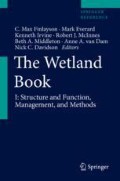Abstract
People have coexisted with wetlands since prehistory, making use of their multiple beneficial services and averting unintended consequences. It is therefore unsurprising that a depth of traditional knowledge has been deduced, shared, and subsequently evolved. Modern pressures on wetlands have culminated in international collaboration and knowledge-sharing to avert resource degradation, most evidently under the Ramsar Convention, seeking the wise and sustainable use of wetlands. However, many such sustainable management practices are encoded in traditional knowledge and evolved outside of the contemporary appropriative, industrialized world view. It is with good reason that Principle 11 of the Ecosystem Approach recognizes that “The ecosystem approach should consider all forms of relevant information, including scientific and indigenous and local knowledge, innovations and practices,” and that Principle 12 states that “The ecosystem approach should involve all relevant sectors of society and scientific disciplines”. Not only is inclusion of technical, traditional, and other forms of knowledge valuable for informing more durable management strategies, it is also essential to support more equitable and economically efficient decisions that take account of the interests of all in society.
References
Convention on Biological Diversity. Undated. Principles. Convention on Biological Diversity. undated. http://www.cbd.int/ecosystem/principles.shtml. Accessed 3 Sept 2014.
Ostrom E. Governing the commons: the evolution of institutions for collective action. Cambridge, UK: Cambridge University Press; 1990.
Ostrom E. Self-governance of common-pool resources, W97-2. Workshop in political theory and policy analysis. Bloomington: Indiana University; 1997.
Pandey DN, Gupta AK, Anderson DM. Rainwater harvesting as an adaptation to climate change. Curr Sci. 2003;85(1):46–59.
Umadevi M, Pushpa R, Samapathkumar KP, Bhowmik D. Rice – traditional medicinal plant in India. J Pharmacogn Phytochem. 2012. ISSN 228-4136. http://www.phytojournal.com/vol1Issue1/Issue_may_2012/1.2.pdf. Accessed 3 Sept 2014.
Vidanage S, Perera S, Kallesoe M. The value of traditional water schemes: small tanks in the Kala Oya Basin, Sri Lanka. IUCN water, nature and economics technical paper No. 6. IUCN – The World Conservation Union, Ecosystems and Livelihoods Group Asia; 2005.
Wani SP and Ramakrishna YS. Sustainable management of rainwater through integrated watershed approach for improved livelihoods. In: Sharma BR, Samra JS, Scot CA, Wani SP, editors. Watershed management challenges: improved productivity, resources and livelihoods. IWMI, Colombo; 2005. p. 39–60.
Wani SP, Ramakrishna YS, Sreedevi TK, Long TD, Thawilkal W, Shiferaw B, Pathak P and Keshava Rao AVR. Issues, concept, approaches practices in the integrated watershed management: experience and lessons from Asia. In: Integrated management of watershed for agricultural diversification and sustainable livelihoods in eastern and central Africa: lessons and experiences from semi-arid South Asia. Proceedings of the International Workshop; International Crops Research Institute for the Semi-Arid Tropics (ICRISAT), Nairobi; 2004 Dec 6–7; Nairobi; 2006. p. 17–36.
Wani SP, Sudi R and Pathak P. Sustainable groundwater development through integrated watershed management for food security. Bhu-Jal News Q J. 2009;24(4):38–52. www.cgwb.gov.in/documents/Bhujal-News-24-4.pdf. Accessed 3 Sept 2014.
Author information
Authors and Affiliations
Corresponding author
Editor information
Editors and Affiliations
Rights and permissions
Copyright information
© 2018 Springer Science+Business Media B.V., part of Springer Nature
About this entry
Cite this entry
Everard, M. (2018). Traditional Knowledge and Wetlands. In: Finlayson, C.M., et al. The Wetland Book. Springer, Dordrecht. https://doi.org/10.1007/978-90-481-9659-3_239
Download citation
DOI: https://doi.org/10.1007/978-90-481-9659-3_239
Published:
Publisher Name: Springer, Dordrecht
Print ISBN: 978-90-481-3493-9
Online ISBN: 978-90-481-9659-3
eBook Packages: Biomedical and Life SciencesReference Module Biomedical and Life Sciences

